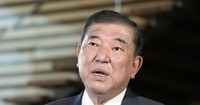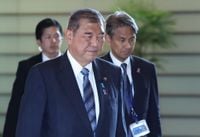On May 7, 2025, the electronic edition of Shukan Bunshun reported allegations against Prime Minister Shigeru Ishiba, suggesting he received over 30 million yen from a male supporter for political fund party tickets without recording these transactions in his political funds revenue and expenditure report. This revelation has raised eyebrows and prompted calls for accountability within Japan's political landscape.
Chief Cabinet Secretary Yoshimasa Hayashi addressed the media during a press conference on the same day, asserting that the Prime Minister's office has responded to inquiries by stating that political funds are managed in accordance with existing laws and regulations, and that all revenue and expenditures are duly reported. Hayashi emphasized the office's commitment to transparency, saying, "The Prime Minister's office handles political funds appropriately and reports them as required by law."
According to the report, the individual in question had purchased political fund party tickets worth several million yen annually from 2003 to 2014. In addition to these transactions, he allegedly handed over cash to Ishiba's team as 'encouragement money' during his bids for leadership in the Liberal Democratic Party (LDP) presidential elections in 2008 and 2012. This practice of gifting cash has raised serious concerns regarding the legality and transparency of political funding in Japan.
Masahiro Shimonemoto, a former close aide to Ishiba and representative of the political group 'Shigeru Ishiba Political and Economic Forum,' provided a detailed account to Shukan Bunshun. He revealed that he had been making secret donations to Ishiba over many years, stating, "I have been making secret donations." Shimonemoto recounted that from 2003 to 2014, he purchased party tickets at a rate of 100 tickets per year, sometimes buying up to 300 tickets in a single year. He reportedly paid several million yen in cash to Ishiba's secretaries in envelopes and received bundles of blank receipts in return.
Shimonemoto claimed that he also transferred cash on five occasions as 'encouragement money,' totaling 1 million yen each time. He estimated that the total amount he contributed to Ishiba over the decade exceeded 30 million yen. However, when Shukan Bunshun examined the political funds revenue and expenditure reports for the relevant period, they found that neither Shimonemoto's name nor the name of the company he managed was listed. This raises suspicions of non-disclosure, which could constitute a violation of the Political Funds Control Act.
The Political Funds Control Act mandates that any individual who purchases party tickets exceeding 200,000 yen must have their name and the amount recorded in the revenue and expenditure report. The absence of these details in Ishiba's reports has led to accusations of illegal under-the-table donations. The situation has sparked significant political discourse, with opposition parties calling for thorough investigations.
Yuichiro Tamaki, representative of the Democratic Party for the People, expressed his concerns during a party executive board meeting, stating, "A proper explanation must be given." He indicated his intention to seek clarification from the Political Ethics Review Board in the Diet, emphasizing the need for transparency in political funding.
As the allegations unfold, the implications for Ishiba's political career could be substantial. The Prime Minister, who has been a prominent figure in Japanese politics, may face increasing pressure to clarify these financial transactions and ensure compliance with the law. The public's trust in political leaders is crucial, and any perceived misconduct could lead to significant political fallout.
In the wake of these revelations, the issue of political funding in Japan is likely to come under greater scrutiny. The public and political analysts alike are watching closely to see how Ishiba and his office will respond to these accusations. The call for accountability in political financing is not just about one individual; it reflects broader concerns regarding transparency and integrity in Japan's political system.
As the story continues to develop, the political landscape in Japan may shift, depending on the outcomes of investigations and public sentiment regarding these allegations. The need for reform in political funding practices has never been more apparent, and the actions taken in response to this situation could set important precedents for the future.
In conclusion, the allegations against Prime Minister Ishiba highlight the ongoing challenges surrounding political funding in Japan. With calls for transparency and accountability growing louder, the coming weeks will be critical in determining the impact of these revelations on Ishiba's political future and the broader discourse on political ethics in the country.





